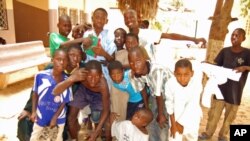A child-help hotline in Senegal provides around-the-clock counseling and protection for young people suffering physical or emotional harm. The free phone service is working to help vulnerable children from across West Africa.
At Dakar’s Ginddi Center for children in difficulty there has not been electricity for most of the week, something of the norm in recent months in Senegal. But there is one machine that is constantly working, regardless of power cuts, 24 hours a day, seven days a week.
It is the center's child-help hotline that began last December as a free service to help boys and girls who are in danger, victims of abuse, or living on the street.
The center gets an average of twenty calls per day. Most come from people wanting information about the center - a temporary shelter with a maximum capacity of 70 that also includes a health clinic and learning center. Some of the calls come from kids themselves, a vast majority of whom are boys, anywhere between five and 18 years old, who have run away, some from as far off as Niger and Cameroon and others from right here in Dakar.
A place of refuge
Fifteen-year-old Ibrahima Dia is one such case. Last year, he left his home in Tivaoune, a religious community about 100 kilometers northeast of the capital. He was heading for Dakar to find another family member. But Dia has poor eyesight and soon found himself living alone on the streets. A member of the Ginddi Center’s counseling team picked him up and brought him in to stay.
Dia says he comes from a poor family that could no longer look after him. Here he has been able to benefit from the classes. At the health clinic he gets regular treatment for his eyes and is now waiting for a new pair of prescription glasses. Dia says he has also had the chance to learn things here that he has not been taught before - practical things such as silk-screening, and social skills such as how to behave outside the home.
Over the last year, Dia has repeatedly come and gone from the Ginddi center. It is his refuge - a place with an open door policy that provides unconditional support, individual and group counseling and even extracurricular sports and cultural activities. When Dia is not living there, he is back in Tivaoune living with his grandmother, but calls the hotline nearly every day just to speak with one of the six phone operators.
Patience required
Khady Diallo is a trained social worker and leads the Ginddi Center’s team of telephone operators. Khady says the first thing they do as hotline operators is find out the child's name - even if it is only a fake one - and then secondly, to locate them. It is very difficult at the beginning of a phone call to gain the caller's trust. Khady says sometimes a child will call in several times and just keep hanging up. The operators have to be very patient and have a strong capacity to listen and try to understand them.
The hotline is nationwide, but the Ginddi Center lacks the personnel and infrastructure to advertise their service or provide immediate on-the-ground help when a child in need calls from a far-off village. During Senegal’s two biggest Islamic events, Gamou and Magal, the center’s single phone line is flooded with calls from parents and marabouts, or spiritual leaders, whose children have gotten lost or simply run away. Over half the cases the Ginndi Center deals with occur during these two religious gatherings.
Sarata Ly Diallo, director at the Ginddi Center, has lobbied hard to get the “116” hotline started in Senegal.
Ly Diallo says today their big challenge is to fight against children begging in the street. They receive a lot of calls from talibés, or Koranic students who left their daaras, or Koranic schools. Their marabouts may have been forcing them to beg. Diallo says once these talibés get to the Center they usually do not want to leave. And these cases are becoming more and more common.
Too much freedom?
Stories of cruelty and neglect towards talibés in Senegal have become increasingly publicized. A recent case in the local media told of two eight-year-old talibés who were so badly beaten and burned by their marabouts that they were hospitalized for three weeks. The Ginndi Center’s hotline hopes to offer a solution for these victims, especially when they have nowhere else to turn and before it is too late.
Khady says when they first started the hotline there were a lot of marabouts calling in to say the center was fighting against Islam by forbidding daaras to exist. Khady says the center does believe that children should be learning the Koran, but only in good conditions.
There are even some parents who say the Center gives kids too much freedom and that it should not be forbidding parents to beat their children. Khady says that while it is important to reprimand children - whether it is a parent, teacher or marabout - there are limits. She says the Center is not here to fight against religion, but quite the opposite, to fight for the regulation of daaras and against fake schools.




